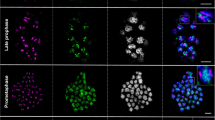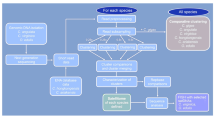Abstract
In the filamentous ascomycete Podospora anserina a 6,935-bp retrotransposon, Yeti, has been identified and characterized. It is flanked by a 5-bp target site duplication and contains long terminal repeats (LTRs) 354 bp in length. The LTRs show a high degree of identity to the previously reported repetitive element repa, a sequence suggested to represent a solo-LTR element of an unknown transposon. In the investigated Podospora strains, the number of complete Yeti copies is significantly lower than the number of repa elements, with up to 25 copies. Yeti appears to be inactive: it is highly degenerate and no transcripts of the element have been detected even in Podospora cultures grown under elevated stress conditions. The amino acid sequences deduced from Yeti display significant homology, particularly in the reverse transcriptase region, to those of other fungal retrotransposons, indicating that it is a member of the gypsy family. As suggested by the unusual dinucleotide content, degeneration of Yeti appears to be the result of a molecular mechanism resembling repeat-induced point mutation in Neurospora crassa.
Similar content being viewed by others
Author information
Authors and Affiliations
Additional information
Received: 10 April 2000 / Accepted: 19 June 2000
Rights and permissions
About this article
Cite this article
Hamann, A., Feller, F. & Osiewacz, H. Yeti– a degenerate gypsy-like LTR retrotransposon in the filamentous ascomycete Podospora anserina . Curr Genet 38, 132–140 (2000). https://doi.org/10.1007/s002940000144
Issue Date:
DOI: https://doi.org/10.1007/s002940000144




